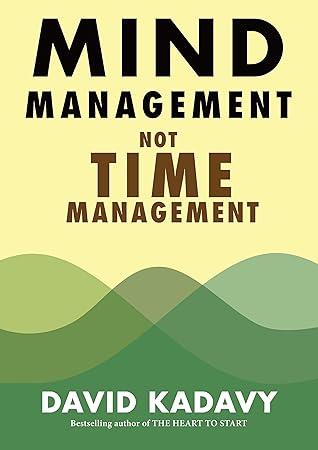More on this book
Community
Kindle Notes & Highlights
Mind Management, Not Time Management: Productivity When Creativity Matters (Getting Art Done Book 2)
by
David Kadavy
Read between
September 12 - November 23, 2022
I had discovered that making progress on my first book wasn’t so much about having the time to write. It was about being in the right state of mind to do the work at hand. I had discovered that today’s productivity isn’t so much about time management as it is about mind management.
Your edge as a human is not in doing something quickly. No matter how fast you move, a computer can move faster. Your edge as a human is in thinking the thoughts behind the doing. As entrepreneur and investor Naval Ravikant has said, “Earn with your mind, not your time.”
The first false assumption time management makes is that time management treats time as a commodity.
The second false assumption that time management makes is that being productive is about producing.
The thing that determines whether what you produce does extraordinarily well or extraordinarily poorly is the quality of your ideas.
The idea appeared to come randomly, but your past knowledge and experience, mixed with the right mental conditions, set the stage for the idea to happen.
“Things are not difficult to make; what is difficult is putting ourselves in the state of mind to make them.”
Creative work is so unpredictable because progress doesn’t happen linearly.
an insight is “a sudden realization, change of perspective, or novel idea, with an emphasis on ‘sudden.’”
It’s not just the amount of time something takes that is important. It also matters from where that time is taken.
The First Hour Rule is simply this: Spend the first hour of your day working on your most important project, and your most important project, only.
research suggests that an event-time orientation promotes a positive mood.
The point of time is not to fill as much life as possible into a given unit of time. The point of time is to use time as a guide to living a fulfilling life.
Don’t race against time, walk along with it.
So, the four stages of control – which scientists widely refer to as the Four Stages of Creativity – are Preparation, Incubation, Illumination, and Verification.
relaxation promotes creativity,
These are the Seven Mental States of Creative Work: Prioritize, Explore, Research, Generate, Polish, Administrate, and Recharge.
When you randomly switch from one activity to another, your energy leaks.
We all know that before you make a big decision, you should “sleep on it.” It’s as if a “Passive Genius” is in our subconscious, working to solve our creative problems while we do something else. Yet few of us use this Passive Genius intentionally in our daily creative work. In a world where we’re always focused on progress and results, it’s easy to forget that sometimes the best thing we can do to make progress on a project is: nothing at all.
is a technique that I call the Alternating Incubation Method. With this method, you can complete two projects in parallel,
If you’re working on something you’ve done many times before, you might not need any breaks at all. If you’re working on a project that is unfamiliar, you’ll need longer periods of Incubation.
The more time you spend away from goal-directed thinking, the more expansive your thinking gets.
The software firm Basecamp works on what is essentially an eight week cycle. They break down projects so that they never take longer than six weeks. Then, they take two weeks “off.” It’s not that they don’t do any work during this break. Instead, they take care of the loose ends that get ignored when they’re driving toward the goal of finishing a project. Then they get ready to take on their next six-week project.
It Doesn’t Have to Be Crazy at Work co-author Jason Fried
“A one-hour increase in average daily sleep raises productivity by more than a one-year increase in education.”
David’s book, Your Brain at Work,
Creative Systems are repeatable processes that help you bring creative works from idea through execution. By formalizing parts of the creative process and turning them into actionable steps, Creative Systems save mental energy.
In other words, things don’t go as planned. That is the plan.
Art is the expression of the chaos of life.
Life is told in stories. Stories are better with happy endings. But happy endings don’t always happen in life.
Some people say that “everything happens for a reason.” I think the appropriate response to that statement is to punch the person who said it in the face. That way, when they ask why you punched them in the face for no reason, you can remind them: “Everything happens for a reason.”
Everything we experience in life is an opportunity to learn something, to make meaning out of it, and to maybe teach someone else what we learned along the way. It’s the least we can do before we too part this world.


